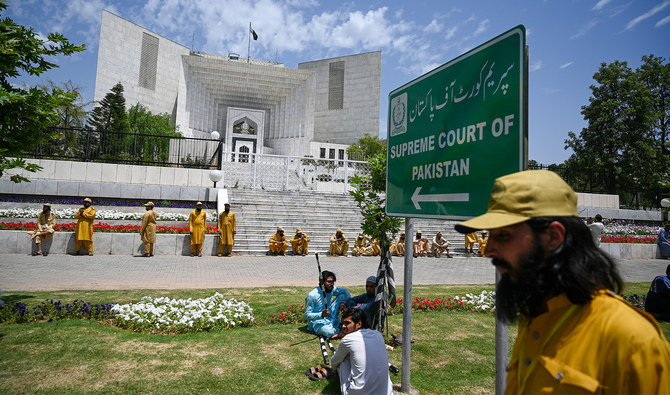ISLAMABAD: A seven-member Supreme Court bench began hearing a suo motu case on Wednesday, following a complaint by six Islamabad High Court (IHC) judges who alleged the country’s top intelligence agencies were interfering in judicial affairs, seeking to influence verdicts through intimidation and coercion.
The IHC judges raised the matter last month in a letter to the Supreme Judicial Council, demanding institutional consultation over the issue and pointing out that such meddling undermined the independence of the country’s judiciary.
Subsequently, Chief Justice of Pakistan Qazi Faez Isa held a meeting with Prime Minister Shehbaz Sharif in which it was decided to form an inquiry commission.
This was followed by the government’s decision to nominate a former Pakistan chief justice, Tassaduq Hussain Jillani, as head of the commission, though he recused himself and said the matter should be probed by the Supreme Judicial Council or the Supreme Court itself.
“There will be zero tolerance on the independence of the judiciary,” the chief justice said at the outset of the hearing.
The top court took the suo motu after members of the legal fraternity widely pointed out that the Supreme Judicial Council had got the powers to investigate the matter by summoning anyone involved.
Many lawyers also thought the incumbent government would not be able to investigate the matter impartially or completely.
“The Supreme Judicial Council should record statements of all those involved in this matter besides examining the available evidence to fix the responsibility,” a former judge, Justice Shaiq Usmani, told Arab News after the decision to form the inquiry committee was taken. “The whole process could be completed through an in-camera inquiry without sensationalizing the matter.”
Prior to that, the IHC judges had provided various examples of the alleged intelligence interference in their letter, including a case concerning Pakistan’s imprisoned former prime minister Imran Khan.
The letter also mentioned incidents where the judges said their relatives were abducted and tortured and their homes were secretly surveilled, aiming to coerce them into delivering favorable judgments in specific cases.
Just a day ahead of the Supreme Court hearing, all IHC judges received letters containing white powder that claimed to be laced with anthrax.
A case was also registered against the unknown sender of the letter and the matter is under police investigation.
















